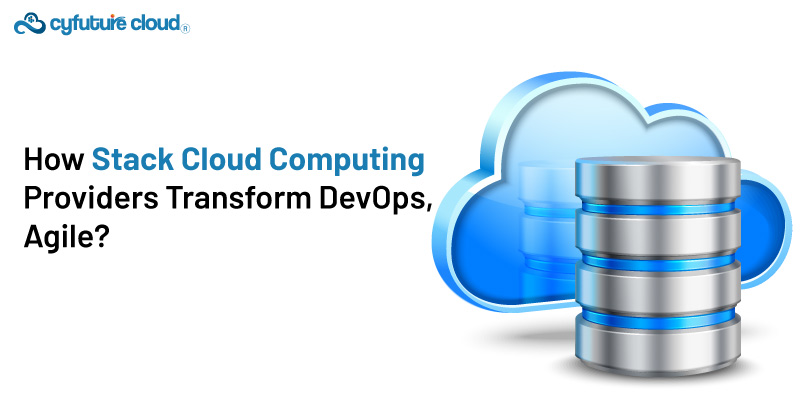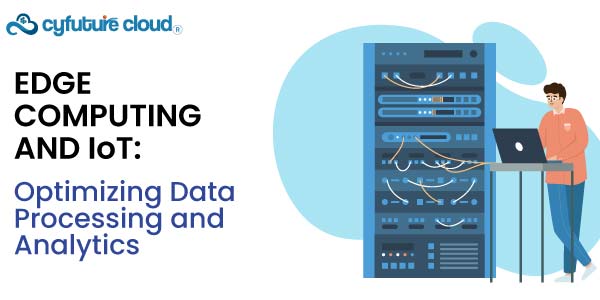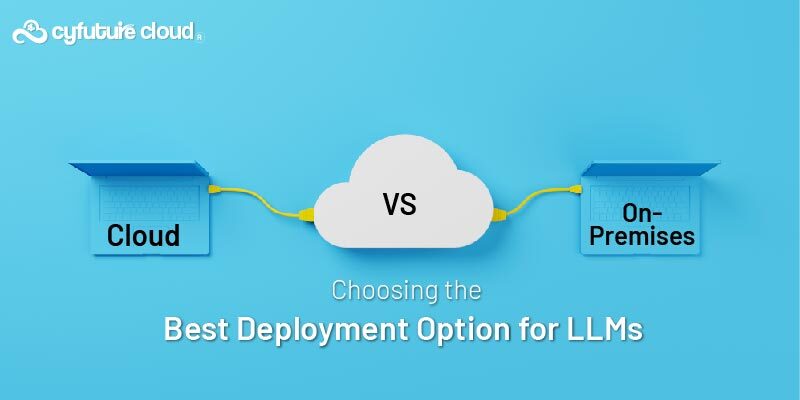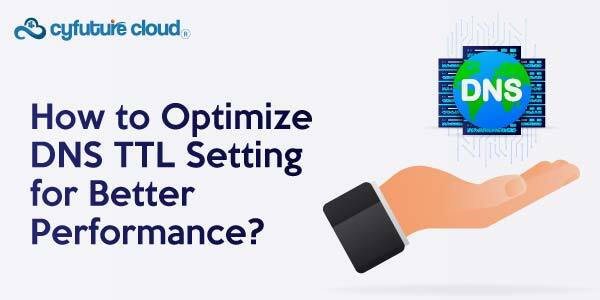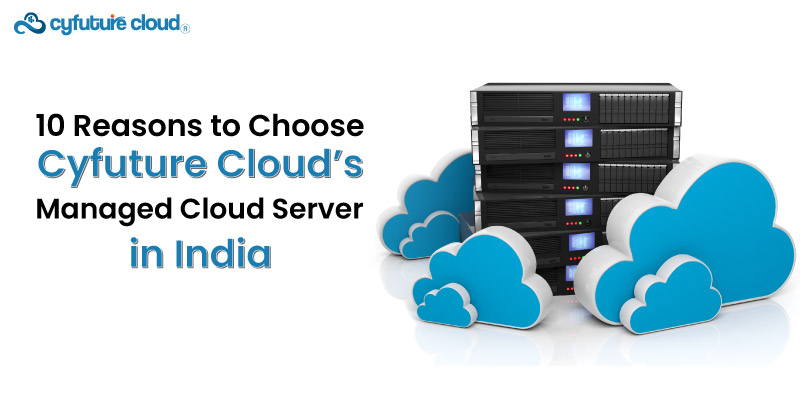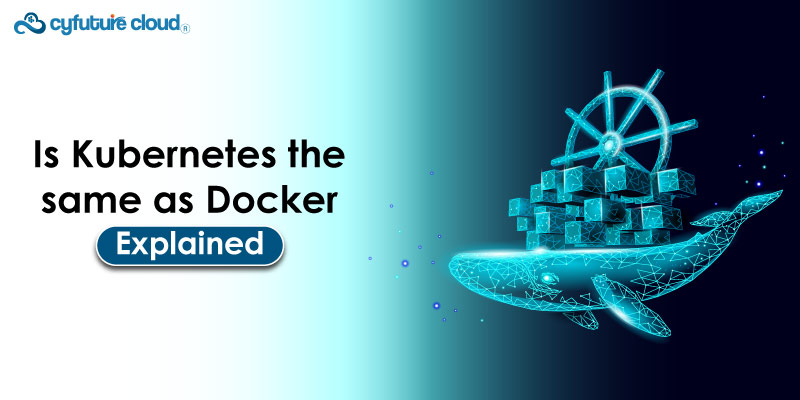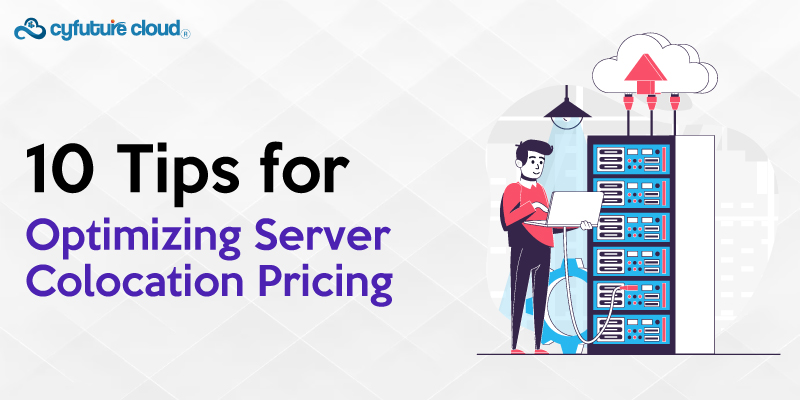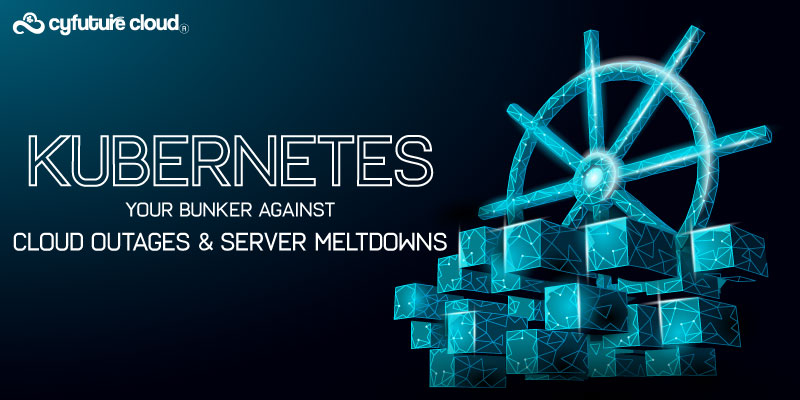Table of Contents
- Getting Introduced to Cloud Based Quantum System
- What is Quantum as a Service (QaaS)?
- Key Components of a Cloud-Based Quantum Computing System
- Benefits of Cloud Computing Using Quantum
- Challenges of Cloud-Based Quantum Computing
- Relationship between Cloud Computing and Quantum Computing
- Cloud-based Quantum Computing Applications
- What is Cloud Based Quantum App Development?
- Advantages Of Cloud Based Quantum App Development
- Key Components of Cloud Based Quantum Computing Applications
- Future of Quantum-Based Cloud Computing
- Why Cyfuture for Cloud Computing Services?
Welcome to the exciting new age of cloud computing! The world of technology is rapidly advancing, and one of the most exciting developments in recent years is the rise of cloud-based quantum computing. This amazing tech can change how we do computing and tackle robust problems that regular computers can’t handle.
According to a 2021 MarketsandMarkets report, the world market for quantum cloud computing will grow at an explosive rate, from $446.8 million to 2.2 billion dollars by 2026. That huge increase of 39.7% was going to be? This surge is in part because most businesses whose applications are best suited to cloud-based quantum computing find it easier to use and also cheap.
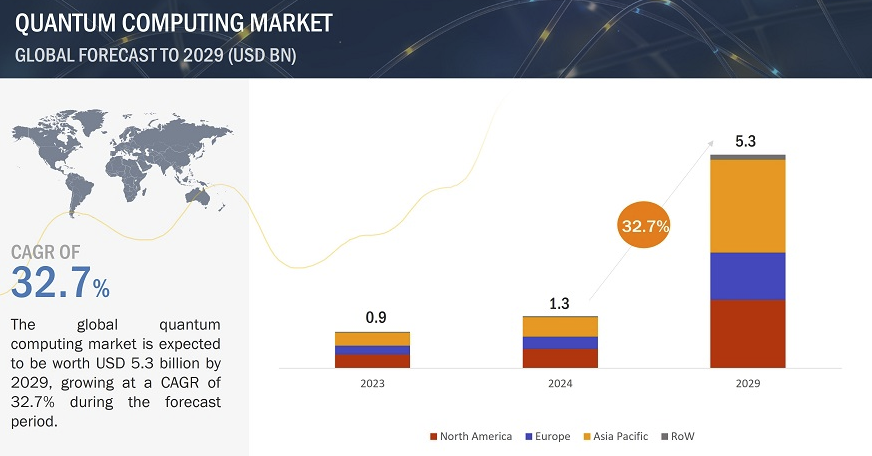
Source: MarketsandMarkets
Cloud based quantum computers are a technology used to run quantum computers over the Cloud rather than the physical hardware located in a dedicated localization. This allows users to work with quantum computers at the same level without the necessity to purchase the hardware and handle its maintenance.
New industries arise that can create a lot of intriguing job positions in such fields as finance, medicine, and science. Numerous businesses such as IBM, Google, and Rigetti are already on the market to give quantum computing systems.
Having quantum cloud computing resources in the software allows us to resolve problems related to better supply chains, better medicine discovery, and simulation of complex systems. This could be a new era of application in which we can drastically improve the way we approach problems and generate new ideas.
In this blog, we will explore the world of quantum computing, starting with the principles of quantum mechanics and ending with the latest in quantum cloud computing applications.
Let’s get started!
Getting Introduced to Cloud Based Quantum System
Cloud based quantum computing refers to executing computing processes using quantum computers. This is a different form of computing that uses the principles of quantum mechanics, which govern the behavior of particles.
In cloud quantum computing applications, people don’t have to bring a quantum computer physically with them; it’s available for them through the Internet, just like email and social media.
Likewise, think of a supercomputer capable of solving very complicated problems at an impressive speed that exceeds the average computer. However, instead of having such a formidable computer in your home or school, you could easily use the Internet. Cloud-based quantum computing is exactly what this is about.
Why is it so exciting? Cloud based quantum computing solutions are exciting because they can solve problems that are beyond the abilities of common computers. These could involve effectively delivering parcels, producing new medicines, or deciphering encryption codes, among other things.
When solving a task in cloud based quantum computing, you have to send it over the Internet to a quantum computer that operates its unique powers to solve the problem. Second, it interprets that and transmits the solution to you via the Internet.
It gives us the power to act swiftly and effectively on real-world problems. Artificial intelligence helps us overcome some of the most complex issues in science, technology, and other fields. It’s like having a super brain at our disposal that can deal with the most difficult obstacles.
What is Quantum as a Service (QaaS)?
Customers can access quantum computing systems through a cloud service called quantum as a service (QaaS). Software as a service (SaaS) is the delivery model used by QaaS.
The qubit, which can superimpose binary locations and support artificial intelligence (AI) beyond its current limited capabilities, is the foundation of quantum computing. Making artificial general intelligence a reality is one of the key objectives of quantum computing.
Although a lot of the theory and practical details for quantum computing have been worked out, the cost of using this sort of computing for commercial purposes is still very high. The QaaS paradigm enables on-demand quantum computing experiments by researchers with no capital outlay.
QaaS is still developing. Because they can test every solution to a problem in parallel, quantum computers may appear to the uninitiated to be faster than classical computers. However, a quantum computer actually performs a set of actions known as a quantum algorithm by using the probabilities connected to superpositions and their entanglements. The parameters of a quantum algorithm can be weighted differently, much like in classical learning algorithms.
Key Components of a Cloud-Based Quantum Computing System
| Components | Description |
|---|---|
| Quantum Processors | Real quantum processing units (QPUs) are available for remote access and quantum computations. |
| Quantum Simulators | Tools simulating quantum behavior, aiding algorithm development before hardware execution. |
| Programming Interfaces | APIs and SDKs enable users to write, execute, and manage quantum programs remotely. |
| Visualization Tools | Tools facilitating visualization of quantum circuits, aiding debugging and comprehension. |
| Remote Access Platform | Cloud-based infrastructure provides remote accessibility to quantum hardware and tools. |
| Security Measures | Protocols ensure secure access and data protection for users interacting with the system. |
Benefits of Cloud Computing Using Quantum
There are several potential benefits to using cloud based quantum computing services. Here are a few ones, you must know:
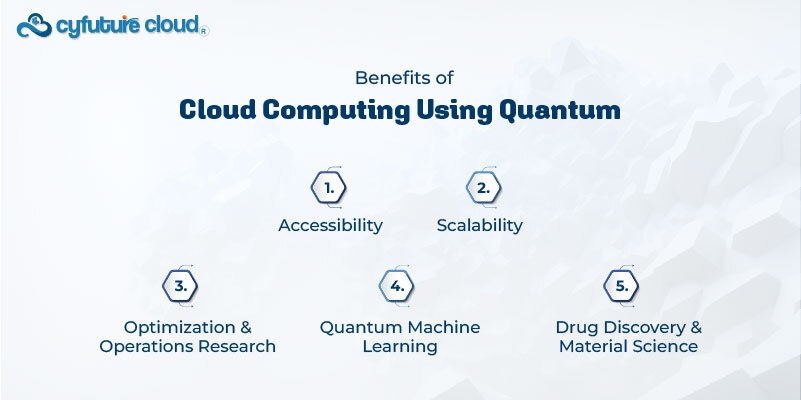
- Accessibility: Cloud-based quantum computing helps many people, businesses and organizations to access breakthrough technologies without high costs of hardware and implementation. That is, utilizing the cloud based environment lets users appraise quantum simulations and algorithms without hardwire spending.
- Scalability: Cloud service providers can adjust the computing power of the quantum infrastructure by scaling it up to match the increased demand and advancements of quantum computing technology. Moreover, it provides users with the ability to operate it in multiple ways, which also means high efficiency in terms of the cost it asks for.
- Optimization and Operations Research: Algorithmic methods such as the Quantum Approximate Optimization Algorithm (QAOA) and the Quantum Annealing Algorithm can handle optimization problems that are hard to solve but can be done quickly. First and foremost, it makes it feasible for businesses to optimize their operations and base operational decisions on quantum-optimized solutions.
- Quantum Machine Learning: Cloud-based quantum computing programs create an environment where different algorithms of quantum machines can be researched. This makes performance in fields like quantum chemistry, cryptography, and financial modeling much more accurate and produces new knowledge and useful information.
- Drug Discovery and Material Science: By virtue of the fast cloud computing which helps in the quick and effective modeling of molecular interactions, the drug discovery process is accelerated, as well as the material science research. Thus, the timelines and the cost of designing and finding new drugs and materials are dramatically decreased.
Challenges of Cloud-Based Quantum Computing
Although cloud-based quantum computing offers several benefits, there are also challenges that must be addressed. Here are a few:
- Limited availability of quantum computing resources: Although clouds offer several advantages to users, quantum computers have the deficiency not being as common as regular computers. Hence creating a shortage and making the users not able to access them in the cloud.
- The complexity of using quantum computers: The implementation of quantum computing calls for specific expertise and ability, and for those who may lack these skills making it tough to employ it effectively in the cloud.
- Interoperability: Notwithstanding quantum computing developments, the issue of interoperability revolution in different quantum computing technologies and platforms can also be quite a challenge due to the use of varying technologies and programming models.
- Lack of skilled professionals: The science of quantum computing is still in its early stages, and there are few specialists who have the knowledge and abilities required to employ quantum computing as the cloud base.
- Limited software and programming languages: The available number of software packages and programming languages is limited when using quantum computing, and most of the tools are at the beginning phase of development. At this stage, it is difficult to implement the quantum computers into a cloud solution.
Relationship between Cloud Computing and Quantum Computing
The term “cloud computing” refers to the delivery of numerous services over the internet, including data storage, servers, networking, and databases. Cloud computing and quantum computing are combined in quantum cloud computing. Cloud Utilizing quantum computing online is what is meant by the term. In a similar vein, cloud quantum computers are computers that may be accessed online via the cloud.
To take better advantage of computing technology, a number of organizations adopting cloud computing, including Google, Microsoft, IBM, and Amazon, are also building cloud quantum computers. Without a physical quantum computer, the network can readily access the cloud quantum computer. The cloud computing ecosystem will give anyone access to quantum computing capacity.
Cloud-based Quantum Computing Applications
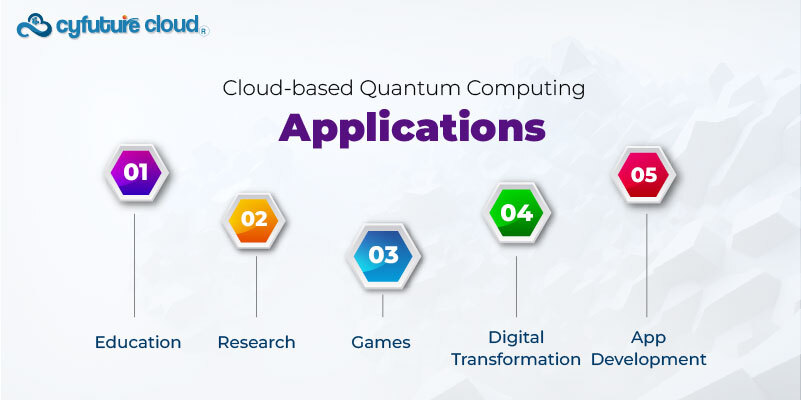
1. Education: Cloud-based quantum computing is used in education to help students understand quantum mechanics and implement/test quantum algorithms.
2. Research: Scientists utilize cloud-based quantum resources to test theories, conduct experiments, and compare architectures in quantum information.
3. Games: Developers create quantum games using cloud-based quantum resources to introduce people to quantum concepts.
4. Digital Transformation: Cloud-based quantum computing is employed in processing terabytes of big data to forecast valuable future outcomes.
5. App Development: Cloud based quantum app development is utilized in developing customized applications for small businesses.
What is Cloud Based Quantum App Development?
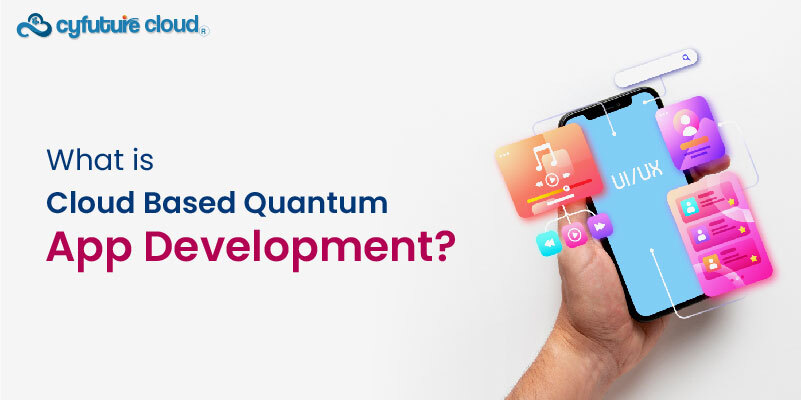
As we can see, there are numerous cloud-based quantum computing applications. However, one crucial application has witnessed tremendous breakthroughs. Yes, we are talking about cloud based quantum app development. As quantum computers begin to move from the domain of theory to the practical, it’s no surprise that the next logical step for your business’s success is cloud based quantum app development.
So, what is cloud based quantum app development? Let’s understand from scratch!
Cloud based quantum app development leverages the features of classical mechanics, particularly the ability of qubits to succumb to multiple superpositions and connect to distant points.
This novel approach elevates quantum computing to new heights. Furthermore, such apps can handle vast and complex collections of data and solve difficult issues with remarkable speed and success rates compared to traditional methods.
|
Must Know Fact McKinsey spotlights the automotive industry as a prime candidate for quantum innovation. They projected an economic impact of $2 to $3 billion by 2030. Beyond just cars, McKinsey also envisions a sprawling ecosystem of 2,000 to 5,000 quantum computers worldwide by the close of the 2020s. |
This feature of quantum computing creates an environment where a quantum computer is an in-demand sophisticated tool in the market of business services. That apart it can work out the hardest issues of industries very quickly and complexly, which causes its behavior to be extremely sought after by companies that realize the desirability of change and want to adopt it into their operational frameworks.
Analysts expect cloud based quantum app development to play a crucial role in AI, banking, and cybersecurity because computing technology is capable of undertaking ultra-rapid calculations that were never possible.
At a practical level, quantum appositions can resort to the parallelism of various outcomes, which accommodates the face of classical computations.
Take cryptography as an example: Though a classical computer would assess the potential keys key-by-key, a quantum application could evaluate all possibilities together, thereby drastically reducing the decryption process time.
The surge in cloud based quantum app development is not an accident; it is the result of multiple interconnected variables that, when combined, are propelling this subject beyond the world of theory and into reality.
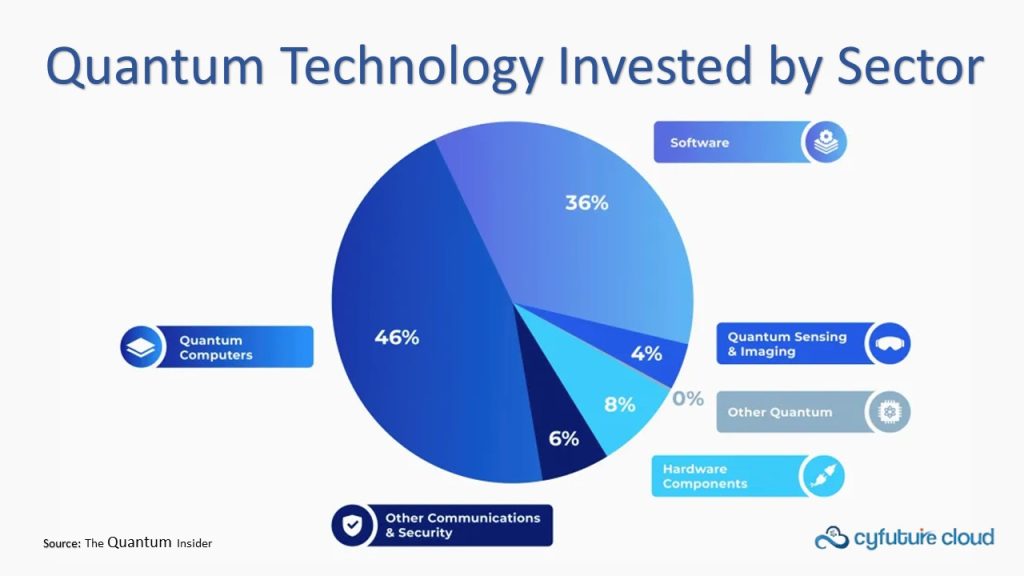
Now, scroll down to discover the advantages of cloud based quantum app development.
Advantages Of Cloud Based Quantum App Development
1. Improved Processing Power
The main advantage of cloud based quantum computing in app development is its much greater processing capability than regular computers. Because of qubits’ unique features, which allow them to be in numerous states at the same time, quantum computers can execute more complicated computations far more effectively and analyze massive datasets in a fraction of a second or less. This enhanced computing capability enables organizations to handle challenges more swiftly and efficiently.
2. Enhanced Speed
Quantum computing’s inherent parallelism, produced by superposition and entanglement, enables it to handle vast quantities of data simultaneously. As a result, using cloud based quantum app development solutions can significantly reduce the time required to perform complex calculations, resulting in faster decision-making insights and potential speed advantages in areas such as real-time analytics, financial modeling, and logistical planning.
3. High Security
Quantum computing provides a completely new degree of security. Quantum cryptography and quantum key distribution (QKD) offer nearly impenetrable encryption since every effort to view or disturb a quantum system alters its state, making eavesdropping apparent. This high level of security can help organizations safeguard their data from cyber-attacks. Cloud based quantum app development may be especially helpful in areas like banking and healthcare, where data security is critical.
4. Increased Productivity
With their enormous processing power and speed, quantum applications may automate and simplify complicated activities, resulting in considerable productivity increases. They can do data-intensive operations, evaluate patterns in enormous datasets, and execute simulations at speeds that would be impossible with typical computer resources.
5. Cost Effective Method
Quantum computing, once completely developed, has the potential to be a low-cost approach to addressing complicated computational problems. Certain tasks that would take years to accomplish on a normal computer might be completed in a fraction of the time by a quantum computer, saving resources and computing expenses.
6. Better Algorithm Execution
Quantum computer’s intrinsic characteristics allow them to perform complicated algorithms more efficiently and effectively. Combining mobile app development with quantum computing would enable improved optimization, machine learning, and AI algorithm execution, resulting in breakthroughs and advancements in these fields. Quantum machine learning, in particular, shows potential for greatly enhancing AI model training, resulting in more resilient and accurate systems.
Key Components of Cloud Based Quantum Computing Applications
| Quantum Cloud Computing Applications | Description |
|---|---|
| Cryptography and Secure Communication | Quantum algorithms for encryption and secure data transmission, leveraging quantum key distribution and post-quantum cryptography protocols. |
| Optimization Problems | Solving complex optimization problems in logistics, finance, and supply chain management using quantum algorithms like Grover’s and QAOA. |
| Drug Discovery and Molecular Modeling | Simulating molecular structures and interactions for drug discovery, leveraging quantum computing’s potential for faster molecule analysis. |
| Financial Modeling and Portfolio Optimization | Analyzing financial data, risk assessment, and portfolio optimization using quantum algorithms, offering improved predictive analytics. |
| Artificial Intelligence and Machine Learning | Enhancing AI and ML algorithms, including quantum neural networks and quantum-enhanced classifiers, for improved pattern recognition and data analysis. |
| Material Science and Quantum Chemistry | Studying materials at the atomic level, predicting material properties, and simulating chemical reactions with quantum algorithms. |
| Quantum-Safe Cryptography Development | Research and development of quantum-resistant cryptographic protocols to secure data against quantum attacks in the future. |
| Climate Modeling and Environmental Impact Analysis | Analyzing complex climate data for better modeling, predictions, and understanding of environmental impact using quantum computing. |
| Quantum Simulation and Fundamental Physics | Simulating quantum systems and solving fundamental physics problems beyond classical computation capabilities. |
Future of Quantum-Based Cloud Computing
The future of cloud-based quantum computing, according to Martin Reynolds, distinguished vice president of research at Gartner, is more challenging to implement than artificial intelligence. As a result, the ramp-up will take longer and the learning curve will be higher. To start, quantum computers require specific room conditions that are very different from how cloud providers now design and run their data centers.
Programmers must learn new arithmetic and logic skills in order to use quantum computing. Because they are unable to employ conventional digital programming techniques, this is challenging for them. To implement quantum computing in the cloud and optimize the hardware and algorithms needed to make this technology work, IT teams must acquire specific knowledge.
The cloud, in spite of its shortcomings, is a fantastic method to use quantum computing. Reynolds claims that despite its deep computation, quantum computing offers little I/O. Due to their technical skills and vast user base, cloud computing companies will be among the first quantum-as-a-service providers. In order to give the greatest software development and deployment stacks, they will look for strategies. In the future years, quantum cloud computing will surpass AI in scope if several practical obstacles can be solved.
Why Cyfuture for Cloud Computing Services?
Cyfuture Cloud is a global IT services and solutions provider that offers a range of cloud computing services. Cloud computing refers to the delivery of computing resources, such as cloud storage, processing power, and software applications, over the internet, rather than using local servers or personal devices.
Cloud computing services can offer many benefits to businesses, including increased flexibility and scalability, reduced costs, and improved security and reliability. Cyfuture Cloud offers a variety of cloud computing solutions, including public, private, and hybrid cloud options, as well as cloud migration services and cloud management services. Some of the specific cloud computing services offered by Cyfuture Cloud include:
- Infrastructure as a Service (IaaS): This type of cloud service provides access to computing infrastructures, such as servers, storage, and networking, on a pay-as-you-go basis.
- Platform as a Service (PaaS): This type of cloud service provides a platform for developing, testing, and deploying applications, without the need to manage the underlying infrastructure.
- Software as a Service (SaaS): This type of cloud service provides access to software applications over the internet, on a subscription basis.
- Data as a Service (DaaS): This type of cloud service provides access to data storage and management services over the Internet.
By working with Cyfuture, businesses can take advantage of the benefits of cloud computing while minimizing the complexity and cost of implementing and managing these solutions.
Get affordable cloud hosting today!
Send this to a friend

 Server Colocation
Server Colocation CDN Network
CDN Network Linux Cloud Hosting
Linux Cloud Hosting Kubernetes
Kubernetes Pricing Calculator
Pricing Calculator
 Power
Power
 Utilities
Utilities VMware Private Cloud
VMware Private Cloud VMware on AWS
VMware on AWS VMware on Azure
VMware on Azure Service Level Agreement
Service Level Agreement 
